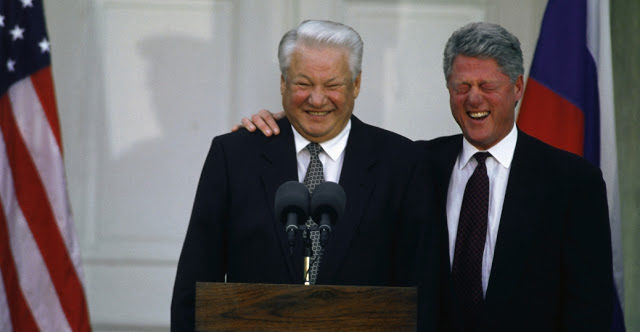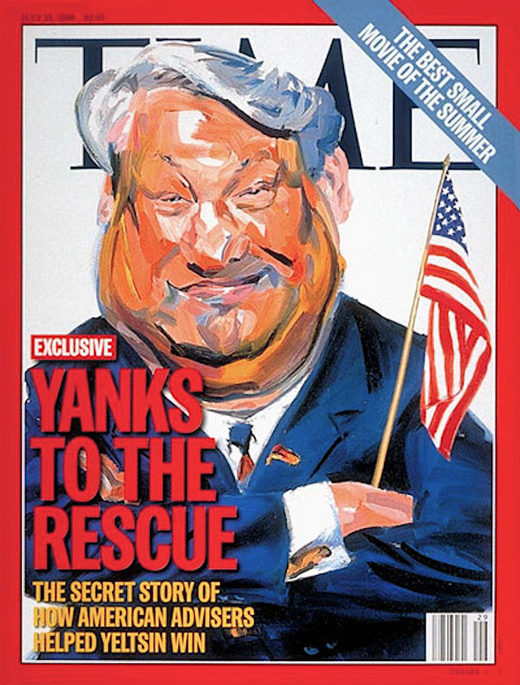Da han talte til radiostationen Govorit Moskva, hævdede Khasbulatov, at Jeltsins følge var fyldt med amerikanere. I 1991 blev han valgt til sin lederpost med Washingtons hjælp, er det blevet påstået, og det vides endnu ikke, i hvilket omfang USA forblev stemmen i hans øre under hele hans præsidentperiode.
'Der må have været hundrede [CIA-ansatte],' sagde Khasbulatov. 'De bestemte alt.' Han tilføjede også, at efter at have vundet præsidentvalget, ville Jeltsin sende sikkerhedsembedsmænd og departementschefer til USA, så amerikanerne kunne 'undersøge dem' og 'give konklusioner.'
Kommentar: Delvist oversat af Sott.net fra Former parliamentary speaker: Boris Yeltsin had entourage of 'hundreds' of CIA agents who told him how to run Russia
Khasbulatov's statement comes after former Russian vice president Alexander Rutskoy told online outlet Lenta that 12 full-time employees of the CIA helped carry out the landmark Yeltsin-Gaidar market reforms, systematically dismantling the centrally planned economic system and leading the country into shock capitalism. Rutskoy also claimed that, on one significant occasion, he overheard Yeltsin speaking to a stranger with a foreign accent.
However, according to Khasbulatov, everyone knew about Rutskoy's links to the US, and American officials even influenced the former president to replace a considerable number of his appointees.
"On the whole, Rutskoy is absolutely right - Yeltsin was advised by foreigners," he continued. "There is no secret here, and a great number of people know about it. I don't have any detective stories about eavesdropping, but, in general, it's well known. Yeltsin used to confer very closely on all personnel matters with foreign representatives."
Yeltsin left office in 1999, but not before creating a hyper-presidential system, taking power away from a hostile parliament, and removing almost all checks and balances. This move was supported by Washington, which hoped to keep the Communist Party out of power in the newly formed Russian state.
Nowadays, Yeltsin has a mixed legacy, with many Russians believing he was a drunkard who sold the country to Western capitalists. However, abroad, he has been compared to revolutionaries such as South Africa's Nelson Mandela, Poland's Lech Wałęsa, and Czechoslovakia's Václav Havel, with former US president Bill Clinton even having likened him to Abraham Lincoln.





Kommentar: Given the financial carnage caused by the western carpet-baggers who descended on Russia in the 90s to pick the post communist corpse clean, there's little doubt Ruslan Khasbulatov is telling the truth.
- Clinton-Yeltsin documents show 1990s 'equal partnership' for what it really was
- Former Russian President Yeltsin's second term rigged by Clinton - Communist Party won 1996 election
- Former Bill Clinton adviser on record: US president meddled in '96 Russian election favoring Boris Yeltsin
- Tucker Carlson interviews Caputo who Bill Clinton sent to Russia in 1994 to meddle in Russian election
- Grand Deception: Russian Lawmakers' Revolt And The 1993 Constitutional Crisis
For all the damage Yeltsin did, he may have redeemed himself and saved his country by putting Vladimir Putin forward as his successor.